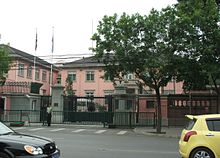- China–United Kingdom relations
-
British-Chinese relations 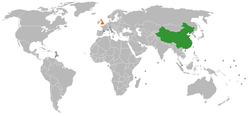

China
United KingdomBritish–Chinese relations (simplified Chinese: 中英关系; traditional Chinese: 中英關係; pinyin: Zhōng-Yīng guānxì), also known as Sino-British relations and Anglo-Chinese relations, refers to the interstate relations between China and the United Kingdom. Although on opposing sides of the Cold War, both countries were allies during World War II, and are members of the UN. Because of the Cold War, First and Second Opium War, and the status of Hong Kong, and other issues, China-UK relations at some points in history have been complicated, but better at other times.
Today, however, China and Britain enjoy a friendly, cooperative, and close relationship. China and Britain have established a full strategic partnership and close cooperation.[1][2]
Contents
Chronology
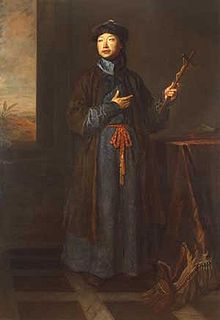 Michael Shen Fu-Tsung resided in Britain from 1685 to 1688. "The Chinese Convert" by Sir Godfrey Kneller, 1687.
Michael Shen Fu-Tsung resided in Britain from 1685 to 1688. "The Chinese Convert" by Sir Godfrey Kneller, 1687.
Between England and the Ming Dynasty (1638 - 1644)
- 27 June 1637 First direct contact between British and Chinese. Four heavily-armed ships under Captain John Wendell, arrive at Macao in an attempt to open trade between England and China. They are not backed by the East India Company, but rather by a private group led by Sir William Courteen, including King Charles I's personal interest of £10,000. They are opposed by the Portuguese authorities in Macao (as their agreements with China require) and quickly infuriate the Ming authorities. Later in the summer they easily capture one of the Bogue forts, and spend several weeks engaged in low-level fighting and smuggling. After being forced to seek Portuguese help in the release of three hostages, they leave the Pearl River on 27 December. It is unclear whether they returned home.[3][4][5]
Between the UK and the Qing Dynasty (1644 - 1911)
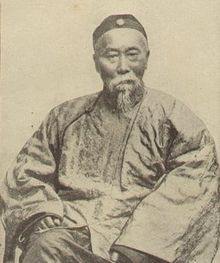 Skilled diplomat, Li Hongzhang acted as a negotiator between the West and the late Qing Dynasty. Queen Victoria made him a Knight Grand Cross of the Royal Victorian Order.
Skilled diplomat, Li Hongzhang acted as a negotiator between the West and the late Qing Dynasty. Queen Victoria made him a Knight Grand Cross of the Royal Victorian Order.
- 1685 Michael Shen Fu-Tsung visits Britain and meets James II.[6]
- 1793 George Macartney, 1st Earl Macartney led the Macartney Embassy to Beijing
- ca. 1820-1830 - British merchants turn Lintin Island in the Pearl River estuary into a center of drug trade.[7][8]
- 1839-42 First Opium War
- 1841 - Convention of Chuenpee, intended to end the war and to cede Hong Kong Island to the British, signed, but never ratified
- 29 August 1842 - Treaty of Nanking ends the war. It includes the cession of Hong Kong Island to the British, and opening of five treaty ports to international trade
- October 1843 - Treaty of the Bogue supplements Treaty of Nanking by granting extraterritoriality to British subjects in China and most favored nation status to Britain
- 1856-60 Second Opium War
- June 1858 - The Treaty of Tientsin is signed by Lord Elgin
- October 1860 - the sack and destruction of the Old Summer Palace by the victorious British and French troops
- October 1860 - Convention of Peking ends the war. Kowloon Peninsula is ceded to Britain
- 26 March 1861 - In accordance with the treaties, a British Legation opens in Beijing (Peking). In the following few years consulates open throughout the Empire, including Hankou (Wuhan), Takao (Kaohsiung), Tamsui (near Taipei), Shanghai and Xiamen.
- 1868 - The Yangzhou riot
- 1877 - A Chinese Legation opens in London under Guo Songtao (Kuo Sung-t'ao)
- 1888 - War in Sikkim between the British and Tibetans. By the Treaty of Calcutta (1890), China recognizes British suzerainty over northern Sikkim.
- 1896 - Sun Yat-sen is detained in the Chinese Legation in London. Under pressure from the British public, the Foreign Office secures his release.
- 9 June 1898 - Convention for the Extension of Hong Kong Territory (Second Convention of Peking): New Territories are leased to Britain for 99 years, and are incorporated in Hong Kong
- 1898 - The British obtain a lease on Weihai Harbour, Shandong, to run for as long as the Russians lease Port Arthur. (The reference to the Russians was replaced with one to the Japanese after 1905).
- 1900-1901 - The Boxer Rebellion
- 1901 - The Boxer Protocol
- 1906 - Anglo-Chinese Treaty on Tibet, which the UK interprets as limiting China to suzerainty over the region
- 1909 - The Japanese Government claims foreign consulates in Taiwan; the British consulates at Tamsui and Takoa close the following year.
Between the UK and the Republic of China (1912 - )
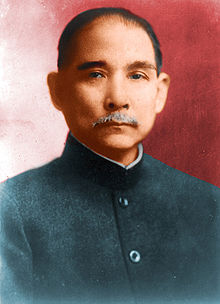 British diplomats rescued Sun Yat-sen from their Qing counterparts in 1896. Sun later founded the Republic of China.
British diplomats rescued Sun Yat-sen from their Qing counterparts in 1896. Sun later founded the Republic of China.
- 1930 - Weihai Harbour returned to China.
- 17 May 1935 - Following decades of Chinese complaints about the low rank of Western diplomats, the British Legation in Beijing is upgraded to an Embassy.[9]
- 1936-37 - British Embassy moves to Nanjing (Nanking), following the earlier transfer there of the Chinese capital.
- 1941-45 - Chinese and British fight side by side against Japan in World War II.
- 6 January 1950 - Her Majesty's Government (HMG) removes recognition from the Republic of China. The Nanjing Embassy is then wound down. The Tamsui Consulate is kept open under the guise of liaison with the Taiwan Provincial Government.
- 13 March 1972 - The Tamsui Consulate is closed.[10]
- February 1976 - The Anglo Taiwan Trade Committee is formed to promote trade between Britain and Taiwan.[11]
- 30 June 1980 - Fort San Domingo is seized by the Republic of China authorities in lieu of unpaid rent.[10]
- 1989 - The Anglo Taiwan Trade Committee begins issuing British visas in Taipei.
- 1993 - British Trade and Cultural Office opened in Taipei.[12]
Between the UK and the People's Republic of China (1949 - )
- 20 April 1949 - The People's Liberation Army attacks HMS Amethyst travelling to the British Embassy in Nanjing and forces a successful British rescue mission. Since the Communist Party of China does not recognize the UK or the Unequal Treaties, they argue the ship has no right to be on the Yangtse.
- 6 January 1950 - HMG recognises the PRC as the government of China and posts a chargé d'affaires ad interim in Beijing (Peking). The British expect a rapid exchange of Ambassadors.[9] However, the PRC demands concessions on the Chinese seat at the UN and the foreign assets of the Republic of China.
- c.1950 - British companies seeking trade with the PRC form the Group of 48 (now China-Britain Business Council).
- 17 June 1954 - Following talks at the Geneva Conference, the PRC agrees to station a chargé d'affaires in London. The same talks resulted in an agreement to re-open a British office in Shanghai, and the grant of exit visas to several British businessmen confined to the mainland since 1951.[13]
- 1950 - British Commonwealth Forces in Korea successfully defend Hill 282 against Chinese and North Korean forces in the Battle of Pakchon, part of the Korean War.
- 1950 - The Chinese People's Volunteer Army defeat the British at the Battle of Chosin Reservoir, part of the Korean War
- 1951 - The Chinese defeat the British at the Battle of the Imjin River after numerous casualties in a pyrrhic victory, in the Korean War.
- 1951 - Chinese forces attacking outnumbered British Commonwealth forces are held back in the Battle of Kapyong.
- 1951 - British Commonwealth forces successfully capture Hill 317 from Chinese forces in the Battle of Maryang San.
- 1953 - Outnumbered British forces successfully defend Yong Dong against Chinese forces in the Battle of the Hook.
- 1954 - The Sino-British Trade Committee formed as semi-official trade body (later merged with the Group of 48).
- 1954 - A British Labour Party delegation including Clement Attlee visits China at the invitation of then Foreign Minister Zhou Enlai.[14]
- 1961 - The UK begins to vote in the General Assembly for PRC membership of the United Nations. It has abstained on votes since 1950.
- June 1967 - Red Guards break into the British Legation in Beijing and assault three diplomats and a secretary. The PRC authorities refuse to condemn the action. British officials in Shanghai were attacked in a separate incident, as the PRC authorities attempted to close the office there.[15]
- June–August 1967 - Hong Kong 1967 riots. The commander of the Guangzhou Military Region, Huang Yongsheng, secretly suggests invading Hong Kong, but his plan is vetoed by Zhou Enlai.[16]
- July 1967 - Hong Kong 1967 riots - Chinese People's Liberation Army troops fire on British Hong Kong Police, killing 5 of them.
- 23 July 1967-25 September 1969 - Anthony Grey, a young Reuters journalist, is kept under house arrest in Beijing, in retaliation for the imprisonment of Communist journalists in Hong Kong.[17]
- 23 August 1967 - A Red Guard mob sacks the British Legation in Beijing, slightly injuring the chargé d'affaires and other staff, in response to British arrests of Communist agents in Hong Kong. A Reuters correspondent, Anthony Grey, was also imprisoned by the PRC authorities.[18]
- 29 August 1967 - Armed Chinese diplomats attack British police guarding the Chinese Legation in London.[19]
- 13 March 1972 - PRC accords full recognition to HMG, permitting the exchange of ambassadors. HMG acknowledges the PRC's position on Taiwan without accepting it.[20]
- 1982 - During negotiations with Margaret Thatcher about the return of Hong Kong, Deng Xiaoping tells her that China can simply invade Hong Kong. It was revealed later (2007) that such plans indeed existed.[16]
- 1984 - Sino-British Joint Declaration.
- 30 June-1 July 1997 - Return of Hong Kong to China.
- 1997 - China and Britain forge a strategic partnership.[1]
- 21 January 2005 - Sino-UK relations have entered mature period.[21]
- 29 October 2008 - HMG recognizes Tibet as an integral part of the PRC. It had previously only recognized Chinese "suzerainty" (supremacy over the local ruler) over the region.[22]
- 29 December 2009 - Sino-British relations strain after the execution of Akmal Shaikh, a British national who was said to have a mental illness,[23] for drug smuggling.[24]
- 26 June 2010 - President Hu Jintao invites British PM for talks in Beijing at the start of what looks like a fresh start for the two nations.
- 5 July 2010 - Both countries pledge closer military cooperation.[25]
- 8 November 2010 - A pledge was made at talks between Chinese Vice Premier Li Keqiang and UK Chancellor of the Exchequer George Osborne for greater cooperation, who will attend the third China-UK Economic and Financial Dialogue in Beijing.
- 9 November 2010 - Sino-UK ties are "in good momentum".[26]
- 10 November 2010 - Both countries pledge closer cooperation.[2]
- 25 November 2010 - senior military officials met in Beijing to discuss military cooperation, including the deputy chief of staff of the People's Liberation Army, and the chief of the general staff of the British army.[27]
- 9 January 2011 - Sino-UK relations are off to a good start.[28]
- 12 January 2011 - China and Britain plans to intensify their strategic partnership.[29]
- 26 June 2011 - Chinese PM visits London in order to plan out trade between the two countries which is worth billions of pounds.
Britons in China
Statesmen
- Sir Robert Hart was an Scots-Irish statesman who served the Chinese Imperial Government as Inspector General of Maritime Customs from 1863 to 1907.
- George Ernest Morrison resident correspondent of The Times, London, at Peking in 1897, and political adviser to the President of China from 1912 to 1920.
Diplomats
- Sir Thomas Wade - first professor of Chinese at Cambridge University
- Herbert Giles - second professor of Chinese at Cambridge University
- Harry Parkes
- Sir Claude MacDonald
- Sir Ernest Satow served as Minister in China, 1900-06.
- John Newell Jordan followed Satow
- Sir Christopher Hum
- Augustus Raymond Margary
Merchants
Military
Missionaries
Academics
- Frederick W. Baller
- James Legge (first professor of Chinese at the University of Oxford)
- Joseph Needham
- Jonathan Spence
Chinese statesmen
Notes
- ^ a b http://english.peopledaily.com.cn/90001/90780/91342/6341963.html
- ^ a b http://www.chinadaily.com.cn/china/2010-11/10/content_11531000.htm
- ^ Mundy, William Walter (1875). Canton and the Bogue: The Narrative of an Eventful Six Months in China. London: Samuel Tinsley. pp. 51. http://www.archive.org/details/cantonboguenarra00mundrich.. The full text of this book is available.
- ^ Dodge, Ernest Stanley (1976). Islands and Empires: Western impact on the Pacific and East Asia (vol.VII). University of Minnesota Press. pp. 261–262. ISBN 9780816607884. http://books.google.com/?id=RE5vls1XeEgC&pg=PA261&lpg=PA261&dq=East+India+China+1637. Dodge says the fleet was dispersed off Sumatra, and Wendell was lost with all hands.
- ^ J.H.Clapham (1927). "Review of The Chronicles of the East India Company Trading to China, 1635-1834 by Hosea Ballou Morse". The English Historical Review (Oxford University Press) 42 (166): 289–292. JSTOR 551695. Clapham summarizes Morse as saying that Wendell returned home with a few goods.
- ^ BBC
- ^ "Shameen: A Colonial Heritage", By Dr Howard M. Scott
- ^ China in Maps - A Library Special Collection
- ^ a b "Britain Recognizes Chinese Communists: Note delivered in Peking". The Times (London): p. 6. 7 January 1950. ISSN 0140-0460.
- ^ a b File documents from the Foreign and Commonwealth Office, passim. [1], released in response to a Freedom of Information Act request at Whatdotheyknow.com
- ^ http://www.roc-taiwan.org/uk/np.asp?ctNode=929&mp=132&xp1=132
- ^ Minutes of Evidence from the Foreign and Commonwealth Office to the House of Commons Select Committee on Foreign Affairs
- ^ "Backgrounder: China and the United Kingdom". Xinhua. 2003. http://news.xinhuanet.com/english/2003-07/16/content_977034.htm. Retrieved 2008-12-10. "Chinese Envoy for London: A chargé d'affaires". The Times (London): p. 6. 18 June 1955. ISSN 0140-0460.
- ^ Mishra, Pankaj (December 20, 2010). "Staying Power: Mao and the Maoists". The New Yorker. http://www.newyorker.com/arts/critics/books/2010/12/20/101220crbo_books_mishra?currentPage=all. Retrieved September 21, 2011.
- ^ Harold Munthe-Kaas; Pat Healy (23 August 1967). "Britain's Tough Diplomatist in Peking". The Times (London): p. 6. ISSN 0140-0460.
- ^ a b "Revealed: the Hong Kong invasion plan", by Michael Sheridan. From The Sunday Times, June 24, 2007
- ^ Stephen Jessel (26 September 1969). "Mrs Grey waits patiently for her son to return". The Times (London): p. 10. ISSN 0140-0460.. Grey's archives are held at the University of East Anglia [2].
- ^ "Red Guard Attack as Ultimatum Expires". The Times (London): p. 1. 23 August 1967. ISSN 0140-0460.
- ^ Peter Hopkirk (30 August 1967). "Dustbin Lids Used as Shields". The Times (London): p. 1. ISSN 0140-0460.
- ^ "Backgrounder: China and the United Kingdom". Xinhua. 2003. http://news.xinhuanet.com/english/2003-07/16/content_977034.htm. Retrieved 2008-12-10. "Ambassador to China after 22-year interval". The Times (London): p. 1. 14 March 1972. ISSN 0140-0460.
- ^ http://www.chinadaily.com.cn/english/doc/2005-01/21/content_411202.htm
- ^ Foreign and Commonwealth Office Written Ministerial Statement on Tibet 29 October 2008. Retrieved on 10 December 2008.
- ^ "British man claimed to be mentally ill executed in China". BBC. 29 December 2009. http://news.bbc.co.uk/1/hi/uk/8433285.stm. Retrieved 29 December 2009.
- ^ Foreign and Commonwealth Office UK condemns the execution of Akmal Shaikh 29 December 2009.
- ^ http://www.china.org.cn/world/2010-07/05/content_20426640.htm
- ^ http://www.chinadaily.com.cn/china/2010-11/09/content_11520521.htm
- ^ "defence.professionals". http://www.defpro.com/news/details/20020/. Retrieved 2010-11-29.
- ^ http://www.chinadaily.com.cn/china/2011-01/09/content_11813446.htm
- ^ http://www.gov.cn/misc/2011-01/12/content_1783208.htm
See also
- Japan–United Kingdom relations
- People's Republic of China–France relations
- Foreign relations of Imperial China
- China Policy Institute
- Foreign relations of the Republic of China (from 1911...)
- Foreign relations of the People's Republic of China (after 1949)
- Foreign relations of the Republic of China (...to today)
- British Chinese (Chinese people in the UK)
- Sustainable Agriculture Innovation Network (between the UK and China)
Further reading
- Pratt, JT. China and Britain (Collins, 1944).
- Gerson, JJ. Horatio Nelson Lay and Sino-British relations. (Harvard University Press, 1972)
- Ruxton, Ian (ed.), The Diaries of Sir Ernest Satow, British Envoy in Peking (1900-06) in two volumes, Lulu Press Inc., April 2006 ISBN 9781411688049 (Volume One); ISBN 9781411688056 (Volume Two)
- Winchester, Simon. The Man Who Loved China: The Fantastic Story of the Eccentric Scientist Who Unlocked the Mysteries of the Middle Kingdom. Harper (May 6, 2008). ISBN 9780060884598
See also
- China-UK Economic and Financial Dialogue
External sources
- Erik Ringmar, Fury of the Europeans: Liberal Barbarism and the Destruction of the Emperor's Summer Palace
- Backgrounder: Sino-British Relations
 Foreign relations of the People's Republic of China
Foreign relations of the People's Republic of ChinaAfrica Algeria · Angola · Benin · Botswana · Burkina Faso · Burundi · Cameroon · Cape Verde · Central African Republic · Chad · Comoros · Congo, Democratic Republic of the · Congo, Republic of the · Côte d'Ivoire · Djibouti · Egypt · Equatorial Guinea · Eritrea · Ethiopia · Gabon · Gambia · Ghana · Guinea · Guinea-Bissau · Kenya · Lesotho · Liberia · Libya · Madagascar · Malawi · Mali · Mauritania · Mauritius · Morocco · Mozambique · Namibia · Niger · Nigeria · Rwanda · São Tomé and Príncipe · Senegal · Seychelles · Sierra Leone · Somalia · South Africa · South Sudan · Sudan · Swaziland · Tanzania · Togo · Tunisia · Uganda · Zambia · Zimbabwe
Asia Afghanistan · Armenia · Azerbaijan · Bahrain · Bangladesh · Bhutan · Brunei · Burma · Cambodia · China, Republic of (Taiwan) · East Timor · Georgia · India · Indonesia · Iran · Iraq · Israel · Japan · Jordan · Kazakhstan · Korea, North · Korea, South · Kuwait · Kyrgyzstan · Laos · Lebanon · Malaysia · Maldives · Mongolia · Nepal · Oman · Pakistan · Palestine · Philippines · Qatar · Russia · Saudi Arabia · Singapore · Sri Lanka · Syria · Tajikistan · Thailand · Turkey · Turkmenistan · United Arab Emirates · Uzbekistan · Vietnam · YemenEurope Albania · Andorra · Austria · Belarus · Belgium · Bosnia and Herzegovina · Bulgaria · Croatia · Cyprus · Czech Republic · Denmark · Estonia · Finland · France · Germany · Greece · Hungary · Iceland · Ireland · Italy · Latvia · Lithuania · Luxembourg · Macedonia · Malta · Moldova · Monaco · Montenegro · Netherlands · Norway · Poland · Portugal · Romania · Russia · San Marino · Serbia · Slovakia · Slovenia · Spain · Sweden · Switzerland · Turkey · Ukraine · United Kingdom · Vatican CityNorth America Antigua and Barbuda · Bahamas · Barbados · Belize · Canada · Costa Rica · Cuba · Dominica · Dominican Republic · El Salvador · Grenada · Guatemala · Haiti · Honduras · Jamaica · Mexico · Nicaragua · Panama · Saint Kitts and Nevis · Saint Lucia · Saint Vincent and the Grenadines · Trinidad and Tobago · United StatesOceania Australia · Fiji · Kiribati · Marshall Islands · Micronesia · Nauru · New Zealand · Palau · Papua New Guinea · Samoa · Solomon Islands · Tonga · Tuvalu · VanuatuSouth America Argentina · Bolivia · Brazil · Chile · Colombia · Ecuador · Guyana · Paraguay · Peru · Suriname · Uruguay · VenezuelaMultilateral Diplomacy  Foreign relations of the United Kingdom
Foreign relations of the United KingdomAfrica Egypt · Libya · Morocco · Namibia · Sudan · South Africa
Americas Argentina · Barbados · Canada · Chile · Mexico · United States (Special Relationship) · Uruguay · VenezuelaAsia Middle East:Bahrain · Iran · Iraq · Israel · Oman · Palestine · Saudi Arabia · United Arab Emirates · YemenElsewhere:China · India · Indonesia · Japan · Kazakhstan · Kyrgyzstan · Malaysia · Pakistan · Singapore · South Korea · UzbekistanEurope Albania · Armenia · Azerbaijan · Belgium · Bulgaria · Cyprus · Czech Republic · Denmark · France · Germany · Greece · Holy See · Iceland · Ireland · Italy · Lithuania · Kosovo · Malta · Netherlands · Norway · Poland · Portugal · Romania · Russia · San Marino · Serbia · Spain · Turkey · UkraineOceania Australia · Nauru · New Zealand · Papua New GuineaMissions Categories:- China–United Kingdom relations
- British expatriates in China
- Chinese community in the United Kingdom
- Bilateral relations of the United Kingdom
- Bilateral relations of China
Wikimedia Foundation. 2010.


